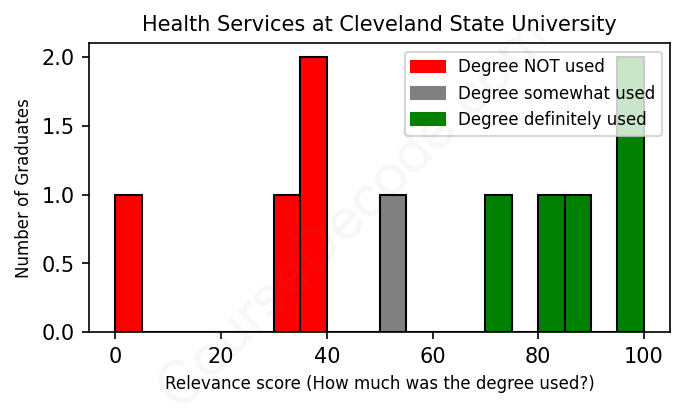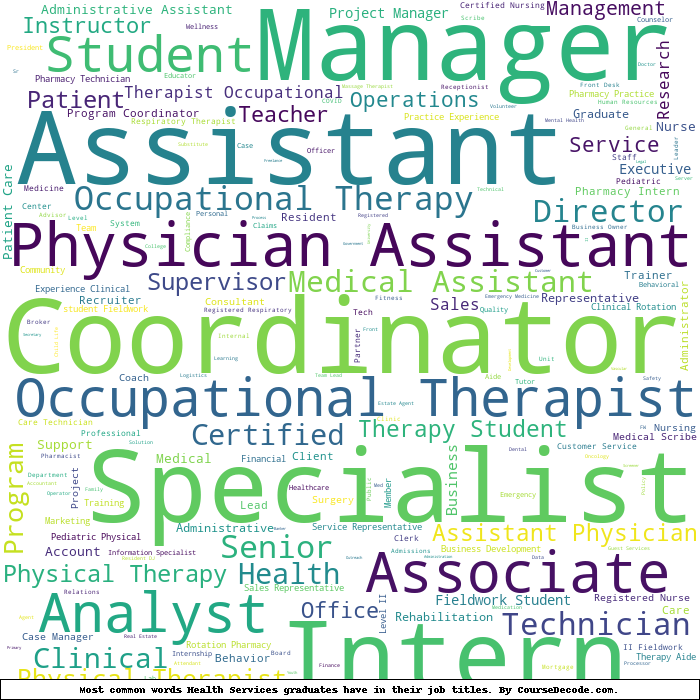
First, some facts. Of the Health Services graduates from Cleveland State University we've analyzed , here's how many have used (or NOT used) their degree in their career:

These are estimates based on AI analysis of 10 LinkedIn profiles (see below).
The verdict? Below average. Overall, with an average relevance score of 60%, Health Services graduates from Cleveland State University have a lower likelihood (-7%) of finding work in this field compared to the average graduate across all fields:
And for comparison, here's the chart for all profiles we've looked at across all degrees.
Also, after graduating, only 10% of these graduates have pursued further education other than another Bachelor's degree (such as a Masters degree or other), compared to the average across all profiles of 35%. This suggests a Bachelors degree is enough for most Health Services graduates, and it's normal to look for work straight after graduation.
See the details:
|
Relevance score: 100% We think this person has gone into a career highly relevant to their degree. We think this person has gone into a career highly relevant to their degree.
DEGREE INFOGraduated in 2013 from Cleveland State University with a Bachelor of Health Science in Health Services. Also pursued further education since (see below). JOB HISTORY SINCE GRADUATIONPhysical Therapist Drayer Physical Therapy Institute Jan 2018 - Sep 2019 Physical Therapist  OrthoAlabama Spine & Sports Sep 2019 - Oct 2020 Doctor of Physical Therapy  MTS Physical Therapy and Wellness Oct 2020 - May 2022 Doctor of Physical Therapy  Select Physical Therapy May 2022 - Present FURTHER DEGREES DONE SINCE GRADUATINGDoctor of Physical Therapy StudentUniversity of St. Augustine for Health Sciences 2015 - 2017 ABOUTI enjoy helping, empowering, and educating others about health and wellness and the way it can improve their lives. |
The top 10 most common jobs done by the graduates we've analyzed (ranked most common to least) are:
A lot of people who graduated with a degree in Health Services from Cleveland State University have ended up in a variety of roles, and the relevance of these positions to their degree varies quite a bit. Some, like the Physical Therapists or Medical Assistants, are clearly using the knowledge and skills they gained during their studies. These jobs definitely align well with the field and highlight the practical application of their education. On the other hand, many individuals have taken on jobs that seem only loosely connected to Health Services, such as administrative roles or positions in sales. While they might benefit from some general understanding of healthcare or community needs, these roles often don’t require the specialized training associated with the degree.
Overall, it seems like a mixed bag. There are clear examples of graduates making a direct impact in healthcare settings, but there are also many in roles that don’t fully utilize their academic background. So, while some of their jobs are very relevant, others feel more like side steps or detours rather than a straight line into health services. This kind of variety is pretty common, especially in a field as broad as Health Services, where not every position will align perfectly with one's educational path. It shows the diverse opportunities out there, even if not all of them tap into the heart of what they studied.
Here is a visual representation of the most common words in job titles for Health Services graduates (this is across all Health Services graduates we've analyzed, not just those who went to Cleveland State University):

When you look at the career paths of graduates from Cleveland State University who studied Health Services, you see a pretty mixed bag, but there are definitely some common themes. Right after graduation, many seem to land jobs within healthcare settings, particularly in roles like coordinators or administrative positions. For instance, the graduates from 2011 found themselves in various roles at the Cleveland Clinic, climbing the ranks within a reputable healthcare facility. This suggests that a lot of these graduates might kick off their careers in supportive roles that ultimately contribute to health service delivery.
Fast forward five to ten years later, and it seems like some graduates transition into more specialized roles, while others have shifted gears entirely, moving into fields like real estate or analytics. For instance, the graduate from 2013 became a Doctor of Physical Therapy, which is a strong alignment with their health services background. However, others have taken more unexpected paths, like working in sales or serving as a claims examiner, which don’t directly tie back to health services. Overall, while many remain within the healthcare system, not all take a direct route, and some explore various industries, showing that a degree in Health Services can open doors to a range of career possibilities, albeit not always what you might expect based on the major alone.
Honestly, a Bachelor’s degree in Health Services can be a bit of a mixed bag when it comes to difficulty. At Cleveland State University, like many schools, you’ll find a balance of courses that are pretty manageable and some that can really challenge you—especially if science and health-related topics aren't your strong suit. Generally, it’s not the hardest degree out there, but it does require you to stay organized, keep up with readings, and maybe juggle some group projects. If you’re someone who’s motivated and has a genuine interest in the field, you’ll probably find it to be easier than average! Just be ready to put in the effort, and don’t hesitate to ask for help when you need it.
Most commonly, in the LinkedIn profiles we've looked at, it takes people 3 years to finish a Bachelor degree in Health Services.
Looking at these Health Services graduates from Cleveland State University, it seems like most of them have landed jobs that can potentially lead to decent pay, especially those who have climbed the career ladder within established organizations like the Cleveland Clinic and Inventory Optimization Solutions. For example, the graduate who moved from Financial Coordinator to a Manager role likely saw a nice bump in their salary along the way. However, there are a few others, like the graduates who worked entry-level positions like server or in retail, that probably didn’t make as much. Overall, it feels like there's a solid mix, and while some are definitely making bank, others might still be working their way up and earning less, at least for now.
Here is a visual representation of the most common words seen in the "about" section of LinkedIn profiles who have a Bachelor degree in Health Services (this is across all Health Services graduates we've analyzed, not just those who went to Cleveland State University). This may or may not be useful:

Here are all colleges offering a Bachelor degree in Health Services (ordered by the average relevance score of their Health Services graduates, best to worst) where we have analyzed at least 10 of their graduates:
| College | Score | Count |
|---|---|---|
 The Ohio State University The Ohio State University
|
88 | 14 |
 Quinnipiac University Quinnipiac University
|
88 | 10 |
 Grand Valley State University Grand Valley State University
|
87 | 16 |
 University of Tampa University of Tampa
|
87 | 10 |
 Stony Brook University Stony Brook University
|
80 | 15 |
 Boston University Boston University
|
79 | 12 |
 University of Connecticut University of Connecticut
|
78 | 26 |
 Florida Agricultural and Mechanical University Florida Agricultural and Mechanical University
|
76 | 12 |
 Texas A&M University Texas A&M University
|
72 | 16 |
 University of South Florida University of South Florida
|
72 | 26 |
 Boise State University Boise State University
|
71 | 11 |
 University of Central Florida University of Central Florida
|
68 | 47 |
 Florida Gulf Coast University Florida Gulf Coast University
|
68 | 10 |
 James Madison University James Madison University
|
66 | 26 |
 University of Missouri-Columbia University of Missouri-Columbia
|
66 | 17 |
 California State University, Fullerton California State University, Fullerton
|
66 | 13 |
 California State University - East Bay California State University - East Bay
|
66 | 10 |
 Arizona State University Arizona State University
|
62 | 10 |
 Cleveland State University Cleveland State University
|
60 | 10 |
 Stockton University Stockton University
|
58 | 12 |